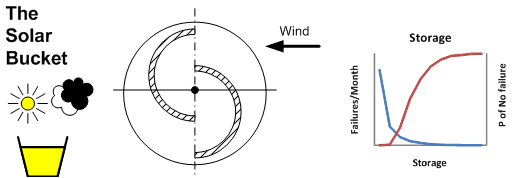Over the past year, I've spent about £60 on LED lights, the first two did not win hearts and minds and they have been relegated to my workspace, but two 3 watt 360 degree bulbs have replaced some passage lights which are most frequently turned on, so 12 watts of LED's have replaced 80 watts of CFL's. This drop in consumption has, in part, caused my electricity provider to repatriate £60 to our bank account. I now have an incentive to go and install some more LEDs. The current crop of LEDs are not a good fit for every place we've got a CFL, but I'm certain I can work a few into the sitting room.
No one noticed the change from a 20 watt CFL to a 3 watt LED in this hall light.
I've had this conversation a couple of times and read accounts of similar ones in the papers. When people install rooftop PV, almost the first thing they do is attempt to balance generation and consumption. If they were taking 3,500 kwh from the grid each year, they try and get this down to the amount generated by the panels, say, 2,500 kwh. A 1,000 kwh/year saving comes quite easily although it may cause tensions within the family if someone becomes too obsessive. Do you have to spend more than £5,000 before you go and find out how much energy your daughter's hair straighteners use. The domestic upset caused a daughter with manky hair, is in my opinion, too high a price, even to save the planet. A better target is the laundry, especially, if there is a tumble dryer involved. If your lifestyle permits it and you have the space, invest in a washing line or whirligig. I suggest that a washing line is a solar thermal device and eligible for the government's Renewable Heat Incentive (RHI). Some not too sophisticated sums suggest that that hanging out the washing, can save several hundred kwh/year relative to a tumble dryer. I live in fear of my ragged underpants becoming a permanent feature of Google Earth but it is a small price to pay for saving the planet.
The picture shows a solar thermal device in action. The drying frame cost about £20 and dries washing with a combination of wind and solar energy, maybe it generates a few hundred kwh/year, contrast this with a rooftop solar water heater which in England's climate also generates the same amount.
And my point is. I'm not going to comment on the merit of schemes like Feed-in Tariffs, RHI and subsidies for electric vehicles, mainly because I have not studied them in sufficient depth to have an informed opinion other than to say that they create an impression that sustainability can only be achieved through major "investment". These schemes have wider implications than sustainability, they also impact job creation, stimulate new industries. New, low cost technologies and small behaviour changes also have a roll to play. This poses the question, if installing rooftop PV causes a drop in consumption, how can you achieve the same saving without the up front payment. Will the prime minister's underwear ever be found on Google Earth?




No comments:
Post a Comment